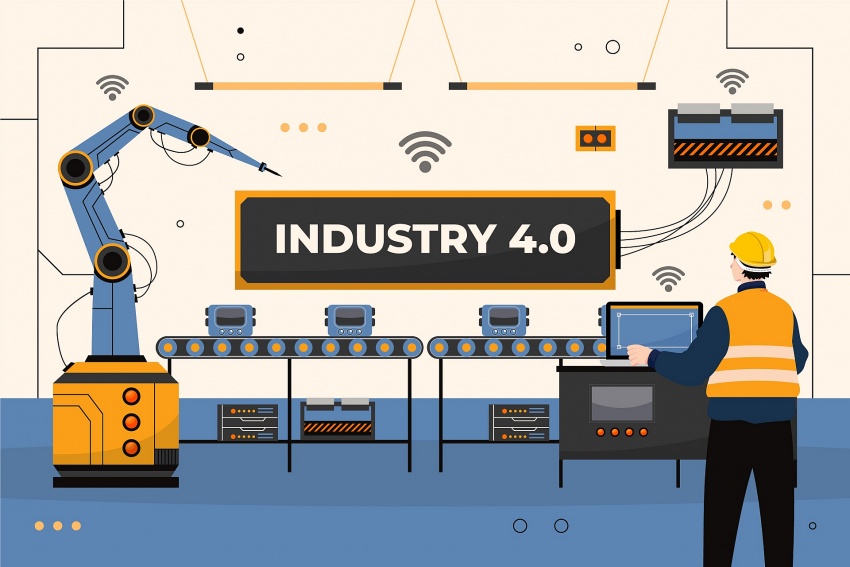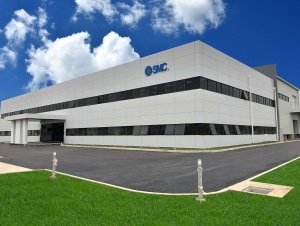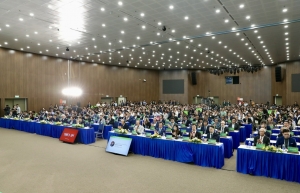Smart manufacturing to be based on 5G technology
5G and AI-based automation are disruptive technologies with immense potential to revolutionise the manufacturing industry, according to those attending the 'Commercialising 5G: Applying to Smart Industries' conference organised by the Vietnam ICT Press Club in Hanoi on December 26.
 |
| Photo: Freepik |
Nguyen Viet Phu, chairman of the ICT Press Club, spoke to VIR on the sidelines of the event, saying, "The convergence of 5G technology and smart manufacturing is reshaping the industrial landscape, ushering in a new era known as Industry 4.0. Here, the power of 5G is being leveraged to enhance connectivity, improve efficiency, and unlock unprecedented possibilities in intelligent manufacturing."
Vietnam is aiming for all industrial parks to adopt 5G technology by the end of the decade, as outlined in the Digital Infrastructure Strategy.
"5G technology plays a pivotal role in boosting efficiency and fostering innovation in industries such as manufacturing, smart factories, and the industrial Internet of Things (IoT)," said Phu. "With Vietnam entering a new era through the nationwide commercial rollout of 5G, the country is being provided with an opportunity to catch up with the industrial advancements already made around the world."
In Europe, pilot 5G applications in factories have demonstrated improvements in cost efficiency, error detection, waste reduction, and customer service response times.
Nguyen Quoc Khanh, deputy director of the Technology Department at Vietnam Posts and Telecommunication Group (VNPT), said, "5G technology will combine with other technologies such as cloud computing, AI, and big data to form comprehensive systems and services, widely serving the economy and society across various sectors."
Khanh also noted that while Vietnam’s manufacturing base is not yet highly advanced, specific sectors and production lines are ready for modernisation. Therefore, as businesses upgrade their production lines, emerging technologies like 5G will be highly suitable for adoption.
"A factory in Spain applying 5G to its production lines achieved approximately 10 per cent in cost reduction, 30 per cent improvement in defect detection, 10 per cent reduction in material waste, and shorter customer service response times, all while reducing operating expenses, increase revenue, and enhance customer experience," he added.
Ho Anh Thang, director of Automation Solutions at TNTech JSC, believes that applying smart technologies in manufacturing could reduce carbon emissions by 5 to 15 per cent, saying, "Businesses in industrial zones are eager to adopt advanced technologies to optimise operational management. Furthermore, applying smart factory solutions enhances their competitiveness in the market," he said.
Thang noted the importance of IoT systems in factory management, stressing the growing need for continuous data sharing between production systems. "When technologies like IoT and cloud computing are applied, data can be centrally collected and managed. Big data analytics can then be employed for forecasting and optimising production processes," he said.
Nguyen Tuan Huy, head of Digital Transformation at MobiFone, highlighted the significant untapped potential for smart factory development. Referencing a survey by the Vietnam Software and IT Services Association, Huy said, "In Ho Chi Minh City’s industrial and export processing zones, 61 per cent of 98 surveyed businesses operate entirely manually without any automation, while 25 per cent have only partial automation. This leaves a significant 86 per cent of businesses lacking full automation."
Huy further observed that only 25 per cent of businesses have implemented any form of intelligent connectivity in their production lines. Despite the promising landscape and high demand, the investment required to develop smart factories remains a major obstacle.
"Transitioning to a smart factory is akin to building an entirely new facility. The question remains whether businesses are willing to invest in digital transformation amidst the current economic challenges," added Huy.
Elaborating on this point, Khanh from VNPT said that integrating 5G and AI into production will require a complete overhaul of existing processes, representing a long-term endeavour, "This transformation demands a more profound understanding and sustained collaboration between businesses and technology providers," said Khan
"These challenges pose significant hurdles to the adoption and implementation of 5G technology in the digital transformation efforts of manufacturing firms," he added.
 | Japan's SMC Corporation steps up manufacturing relocation to Vietnam SMC Corporation, a leading manufacturer of pneumatic control devices, is stepping up its manufacturing relocation plan to Vietnam. |
 | Vietnam semiconductor manufacturing industry ready to join global supply chain Vietnam has the opportunity to become a hub for semiconductor equipment manufacturing and strengthen its integration into the worldwide semiconductor value chain. |
 | Recover opens manufacturing factory with latest recycling technology in Vietnam Recover, the leading global producer of recycled cotton fibre and cotton fibre blends, announced on December 2 the opening of its latest manufacturing facility in Vietnam, marking a significant milestone in the company’s global expansion plan. |
What the stars mean:
★ Poor ★ ★ Promising ★★★ Good ★★★★ Very good ★★★★★ Exceptional
Related Contents
Latest News
More News
- Vietnam, New Zealand seek level-up in ties (February 19, 2026 | 18:06)
- Untapped potential in relations with Indonesia (February 19, 2026 | 17:56)
- German strengths match Vietnamese aspirations (February 19, 2026 | 17:40)
- Kim Long Motor and AOJ Suzhou enter strategic partnership (February 16, 2026 | 13:27)
- Haiphong welcomes long-term Euro investment (February 16, 2026 | 11:31)
- VIFC in Ho Chi Minh City officially launches (February 12, 2026 | 09:00)
- Norfund invests $4 million in Vietnam plastics recycling (February 11, 2026 | 11:51)
- Marico buys 75 per cent of Vietnam skincare startup Skinetiq (February 10, 2026 | 14:44)
- SCIC general director meets with Oman Investment Authority (February 10, 2026 | 14:14)
- G42 and Vietnamese consortium to build national AI infrastructure (February 09, 2026 | 17:32)

 Tag:
Tag:




















 Mobile Version
Mobile Version